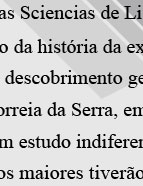

................................
The personality of the statesman inspired one of the most important works in Luso-Brazilian historiography, Alexandre de Gusmão e o Tratado de Madrid [Alexandre de Gusmão and the Treaty of Madrid] (Lisbon, 1950), by Jaime Cortesão, structured around biographical documents and the extensive correspondence concerning the negotiations of the Treaty of Madrid, scattered in the archives of Lisbon. In the words of its author, there one may find "the multiple determining circumstances, the portraits of all those who participated in the negotiations, and the divergent efforts that led to the final agreement; all is revealed there, along with surprising revelations about the character, culture of the men, and the fierce struggle of interests at play." The studies of Luís Ferrand de Almeida—from his monumental undergraduate dissertation (1957) on Portuguese diplomacy and the southern boundaries of Brazil, through his doctoral thesis on Colonia del Sacramento during the War of Spanish Succession (1973), and numerous other publications—although rooted in the lessons of the French "methodical school," opened up to interdisciplinary themes inspired by the Annales school.
The social and economic aspects neglected by traditional diplomatic history have drawn historians' attention to the study of their influence on relations between states without denying the autonomy of political phenomena. In his work on the Bloqueio Continental [Continental Blockade] (1962), Jorge Borges de Macedo emphasised the importance of studying political, military, and diplomatic phenomena in light of economic and social history. Between 1964 and 1974, he supervised several undergraduate theses, focusing particularly on the diplomacy of the Restoration—relations with Venice, Denmark, Spain, France, and England—but also on the role of the diplomat and the impact of the economy on political decisions.
In subsequent years, the socio-economic primacy characteristic of the Marxist paradigm led Portuguese researchers away from political phenomena. Nonetheless, two synthesis works emerged, both resulting from the authors' university teaching: História Diplomática de Portugal [Diplomatic History of Portugal] (1986) by Pedro Soares Martinez and Jorge Borges de Macedo's lectures at the National Defence Institute (1987), published under the title História Diplomática Portuguesa. Constantes e Linhas de Força [Portuguese Diplomatic History. Constants and Lines of Force].
